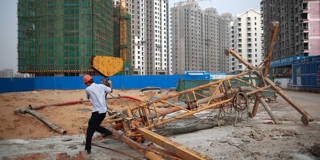Gone are the days when China could point to soaring real-estate prices and rising incomes to justify endless new construction. China’s economic slowdown suggests that housing and office prices are headed for a steep fall that could take down banks and local governments, leading to prolonged stagnation.
CAMBRIDGE – The Communist Party of China’s 20th National Congress, which gave President Xi Jinping an unprecedented third term as general secretary, also featured a leadership shakeup that replaced market-oriented technocrats with Xi loyalists, raising questions about China’s plans for its faltering economy. Excessive state control, after all, is a tried-and-true recipe for becoming mired in the middle-income trap that Chinese leaders have long vowed to avoid.

CAMBRIDGE – The Communist Party of China’s 20th National Congress, which gave President Xi Jinping an unprecedented third term as general secretary, also featured a leadership shakeup that replaced market-oriented technocrats with Xi loyalists, raising questions about China’s plans for its faltering economy. Excessive state control, after all, is a tried-and-true recipe for becoming mired in the middle-income trap that Chinese leaders have long vowed to avoid.